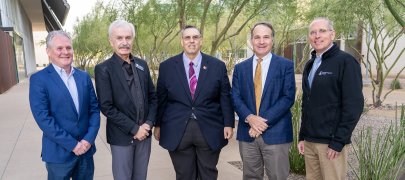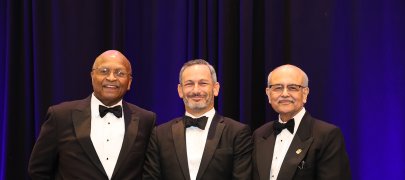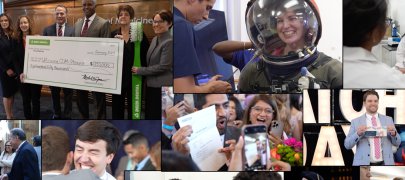Women in Medicine Fighting COVID-19: Jessica Leigh Anderson, MD
In honor of this year’s Women in Medicine and Science month, the University of Arizona College of Medicine – Phoenix has asked a few faculty to share their inspiring stories and work that is helping our community through the coronavirus pandemic.
Meet Jessica Leigh Anderson, MD
Jessica Leigh Anderson, MD, has been working the frontlines as an emergency medicine physician during the coronavirus pandemic. Dr. Anderson, who has been working tirelessly along with her colleagues to care for Arizona residents, is also pregnant in her third trimester.
Dr. Anderson is a clinical assistant professor in Emergency Medicine at the University of Arizona College of Medicine – Phoenix. She has been affiliated with the campus since 2015, when she volunteered to help run simulation sessions, mock residency interviews and provide mentorship experiences to medical students.
Working as a pregnant emergency medicine physician during the COVID-19 pandemic has been challenging and worrisome at times. Doctor availability to patients is paramount. Availability means remaining virus free in an environment where we treat infected patients. As a physician, I was ready for this challenge, but what about the risk to my unborn child? The short and long-term effects of the virus on a fetus are unknown.
As the pandemic evolved, so did testing, treatment and personal safety equipment. Early on, there were conflicting reports on the various ways the virus spread. To protect against airborne exposure, the N95 mask was considered the best option. The national rush for this mask caused local shortages. Out of necessity, the N95 was rationed to higher risk procedures such as intubations and those where aerosolized secretions could occur. During this time, wearing an alternative mask, when evaluating and treating an emergency room patient was unsettling. We compensated by masking patients, minimizing close contact and watching out for each other.
Despite our best efforts, this virus penetrated our defenses. Several of my colleagues were infected and one was even intubated and placed on ECMO (extracorporeal membrane oxygenation) life support in intensive care. The COVID-19 infection seemed random – these were doctors and staff who were careful. I could not help but wonder if my precautions were enough or if I was being reckless while pregnant.
Emergency Room medicine is a collaborative effort that extends to supporting each other. During this pandemic, we were vigilant as a community to reduce individual risk of infection. I had colleagues concerned about me, offering to perform my assigned intubations or see a very sick COVID-19 patient.
The initial weeks of the pandemic were difficult because all that was unknown. In time, our PPE improved, screening and sanitation measures were increased – I made it through.
What has been your day-to-day experience?
I am still working on the frontlines. I will go on maternity leave when I am 36 weeks pregnant. The day-to-day experience is 180-degree different from what it was pre-pandemic. Usually, I would arrive to shift 45-minutes early and go to the doctor's lounge to sign charts and chat with colleagues. Now, I arrive just before a shift starts in order to decrease potential exposure. Upon arrival, everyone gets their temperature taken before entering the hospital and we receive an N95 mask for the day. During my shift, I keep my mask on continuously and only remove it to eat or drink. All patients and staff now wear masks. I might not even recognize a consultant or colleague at first in the emergency room, because everyone is so covered up.
As a physician and soon-to-be mom, what have been your thoughts during the pandemic?
I serve on the frontlines during the pandemic because emergency medicine is what I do. Part of the challenge of the job is not knowing what emergency may come in the door. If there is a risk to our personal safety, we will adapt as a medical community. My unit and the hospitals where I work make personal safety a priority. If we abandon the sick, who will fill the void?
What words of encouragement do you have for other moms out there going through a pregnancy during the pandemic?
We found out I was pregnant early in January 2020 and at that time, the pandemic had not exploded. Along with everyone else, we have had to adjust to the new approaches during my pregnancy. For example, my husband has never met my OB/GYN and he has never been physically present for an ultrasound. We had big plans for a fun gender reveal party that was reduced to include my husband, sister, and parents (all socially distanced). I was not planning on having a baby shower, but a friend is hosting a zoom shower for me in a few weeks. Yet, even though these situations are not ideal, being creative and connecting with family and friends in different ways has been rewarding. If anything, moms who are pregnant now, should remember that we are doing something that no one has had to experience in a long time.
We are all resilient and capable of adjusting to a new normal. Taking care of your health and well-being is more important than ever. Hopefully, we will look back on this and see the courage and determination we all drew upon to get through these rough times.
What advice or words of encouragement do you have for other physicians during this time of uncertainty?
You are not alone. I am in a few groups on a social network that we share similar interests and backgrounds. It is reassuring to stay connected with others. Try not to shut down or go into a dark place all alone; talk to your colleagues and share your thoughts and feelings. Some physicians are staying at hotels or traveling to protect their families. You have to do what you feel is best, but always find a way to stay connected to your friends and family because their love and support will be what will get you through the times you feel uncertain or afraid.
What would you like the community to know about your work as a woman in medicine and science?
I recently spoke with a group of underprivileged middle school girls about college and future careers. I was shocked when one girl was brave enough to say, "I thought all doctors were boys and all nurses were girls." Even to this day, patients will mistake me for a nurse, technician, or volunteer. It is not a malicious assumption, but the community needs to reframe the mindset of what a "doctor" should look like. Standing at 5'2" and now overly pregnant, I do not have the most commanding presence. There should no longer be any stereotypes for what experts in medicine and science "look like." Very few emergency medicine physicians in my group wear the standard white coat. As the old adage goes, don't judge a book by its cover.
About the College
Founded in 2007, the University of Arizona College of Medicine – Phoenix inspires and trains exemplary physicians, scientists and leaders to optimize health and health care in Arizona and beyond. By cultivating collaborative research locally and globally, the college accelerates discovery in a number of critical areas — including cancer, stroke, traumatic brain injury and cardiovascular disease. Championed as a student-centric campus, the college has graduated more than 900 physicians, all of whom received exceptional training from nine clinical partners and more than 2,700 diverse faculty members. As the anchor to the Phoenix Bioscience Core, which is projected to have an economic impact of $3.1 billion by 2025, the college prides itself on engaging with the community, fostering education, inclusion, access and advocacy.


